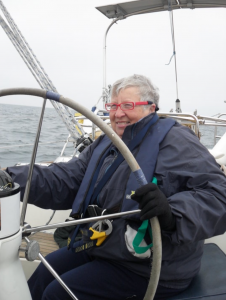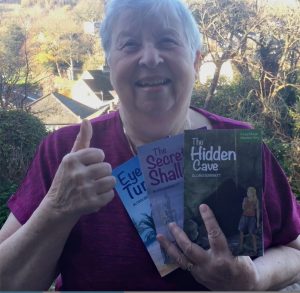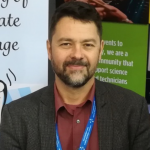About the Author – Gloria Barnett
Click on the hand to see Gloria’s fun introduction to this website ..
The latest review about Gloria’s work …
‘Gloria has deep knowledge of the world’s oceans – the way they function, their role in Earth’s climate systems, the life they harbour, and how all of this responds to human disturbance. Gloria’s knowledge is not just academic, as she has sailed and dived in many oceans around the world. Yet Gloria is above all a science educator, gifted at public speaking and as an author of children’s books about the oceans.’
Alan J. Hesse – Author and Conservationist (January 2022)
About the Author ?
What Do You Need to Know?



My favourite socks are pink – with blue whales on them. I’m older than JK Rowling and younger than Jacqueline Wilson!
Yes – I have a family – married, with three grown-up married children and seven super grandchildren – although I can’t possibly be old enough to be a grandma! No cats or dogs – they make me sneeze!
I loved teaching science in schools, and whilst I was taller than most of the students in Year 7, my ‘A’ level Biology students ‘looked up to me’ at the same time as looking down!

At the present time I wear three ‘hats’
Author of ocean themed books for all ages. Speaker at all types of Conferences and I regularly travel with Cunard to do Insight Lectures – always on the topic of the Ocean World.
Educational Consultant – that sounds posh – but it means I have fun when I go into Primary Schools around the UK and present underwater adventure days. I visit schools as an ‘author’ too.

What I do for fun?
You’ll usually find me working but it doesn’t feel like work at all.
I’m a workaholic when writing my books – 7 days a week when I’m creating the Lucy Adventures or the stories for little learners.
But I do take time off away from my desk to travel around the world.
I’ve been a sailor for most of my life – first owning a small dinghy at the age of 18. (It was the first thing that Chris and I purchased together, before we were even married.) We gradually worked our way up to bigger boats including a 35′ racing yacht, (taking part in races across the English Channel most summer weekends), and eventually ended up owning a Halburg Rassey 42′ cruising yacht. We’ve sailed mostly in UK, French and Netherlands waters on our own boat, but also explored Scotland and Greece on yachting holidays. Most of my sailing in the last few years has been with a Cunard captain at the helm.

Where have I dived?
Chris and I have dived in a variety of areas around the world – Mexico, USA, Caribbean Islands, Israel, Turkey, Red Sea in Egypt, Indonesia and the Philippines. All these places are close to the equator. I admit I don’t enjoy diving in cold water and have never dived in the UK – call me a wimp but I have watched videos from UK divers’ trips beneath the waves, and very beautiful it looks from the comfort of my ‘warm’ settee.
Filmmaker/Photographer – I love editing the underwater film I’ve shot during my dives around the world and I specialise in taking wildlife photos too. Nearly all the photos in this website were taken by me, and my favourites are the whale fluke at the header of the Teacher’s Resource Page (Iceland), and the Crab header on the gallery page (Brazil).
I’m passionate about diving and oceans and my work aims to help people, both adults and children, to understand how incredibly fantastic the oceans are.



I first met Gloria Barnett, aka The Weird Fish Lady, at the annual conference of the Association for Science Education where I launched my first comic book about climate change in 2019. I’ve since tracked her down and we had a fascinating chat all about the oceans and why they’re important.
Gloria is a sailor, diver, teacher, writer, educator and speaker and generally an advocate for the world’s oceans. Join me in getting to know this fascinating lady just a little bit better…
Gloria, aka Weird Fish Lady: you are a walking, talking, writing and diving ocean encyclopedia! I’ve read your website, which is amazing. You’re an author, a teacher and an educator as well. Which of these hats did you put on first, how did it all get going?
Well, I suppose it was sailing. When I was only 18 I met my future husband and we’ve been married for over 50 years now. He was a man who understood boats from the time he was 2 years old so I had to learn to sail if I was going to join the family!
Life went on and I became a science teacher in secondary schools, and then I specialized in teaching advanced level biology. Then one day, our children had grown up and left home. We suddenly realized we had a bit of extra money as a result, so we decided straight away that diving was the thing we wanted to learn to do, and we spent all that money doing that.I retired from teaching early, then did educational consultancy work in the winter and sailed during the summer. Then came the idea from a friend that I should give talks on cruise liners. So I thought, what do I want to talk about, what’s my favorite thing, and it was oceans. I’ve been a speaker on cruise ships for 20 years now, and I started writing books during that time too.
I was inspired at the age of 12. I can remember going to a jumble sale and buying a book with my pocket money; the book was called The Earth: a big, fat volume with loads of diagrams and stuff. I became lost in this book at the age of 12. I hadn’t learnt about oceans at school and this was my first introduction to understanding the Earth and its oceans. Although I didn’t fully realize the importance of oceans until I started diving.
During COVID, without being able to go out on cruise liners to talk, I was speaking via Zoom to loads of Rotary clubs and other organisations, in England, and even Australia, USA and South Africa. My talks are about the Ocean World and my aim was to get people around the world to understand what we know about oceans, especially the fact that plankton produces 70% of oxygen, and seagrass 10%, so that’s a total of 80% oxygen coming from the oceans. Every club and the people I’ve spoken to since June were saying ‘I didn’t know that!’ It’s a turning point for many of my listeners. I help them understand that rainforests and plants are great, but they only produce 20% of the oxygen. It’s the oceans that do the hard work for us.
What do you respond to people who come up to you and ask ‘what can we do, what can I do in my everyday life to help the oceans?’
This is one I get all the time. There’s that lovely phrase: ‘think global, act local’, meaning learn about what’s happening in the world – and then act from your home and your community. I believe as one person you can’t do an awful lot, but as 100 people, or 1000 – you can start to change things. Get together in groups and communities of people and you’ll be surprised what you can achieve.Already, in your own home you can do lots of things: you can sort your plastics from your paper, and recycle and if you’re like me, have 3 different bins in the kitchen. I even use shampoo in little soap blocks to avoid using plastic bottles. We’ve recently invested in solar panels on our roof and they’re working fantastically well. We use bikes a lot more, and we’ve bought an electric car which we love to say ‘runs on sunshine’ as we have our solar panels connected to a battery which charges our car. You can do all these things in your own home as well as working together as a community and encouraging others to do the same. I’m not encouraging people to go out in the streets and join some sort of revolution, though there are people who do that, but the thing to do is definitely reduce our CO2 emissions and fight pollution. I also volunteer with a social enterprise which aims to inform the younger generation of the importance of understanding and protecting the oceans. I’ve written books now for all ages to help school teachers and the children. I’m also a Rotarian and involved with lots of community and international projects all over the world. We raise funds from the public, then distribute the money back into the community where we’ve identified needs. Recently, some of the Rotary Clubs I have spoken to are gifting my books to primary schools. One of the main messages from my talk is how important it is to inform the younger generation now about facts like ‘how much oxygen is produced by the oceans’ and ‘why we should keep the oceans healthy’. We need to tell them, we can’t wait ‘til they are all grown up and reached the age of 50..
In my own work spreading awareness about environmental issues, I find that there is always that reaction where people say ‘why should I do anything if nobody else is?’
I got a question after my talk the other day when somebody said ‘why should I do anything when all the other countries in the world aren’t?’ I replied, ‘well actually, you’ll be surprised at how many countries in the world ARE doing something!’. It’s our country that is behind in this area, and we are actually very far down the list. I explained that we need to realise the UK has a long way to go to catch up with other countries. I think we need to improve our attitudes to climate change, and soon. We need issues about climate change reported correctly on television and in newspapers and include what is happening around the world. Once people know that the movement for change is already happening, then more people will hopefully join in. There is a lot of educating still to be done. Perhaps we should be reporting every day on issues about climate change.
You’re passionate about the oceans, you spend most of your life either on them or in them – what is it about the ocean that most inspires you?
The beauty beneath the waves – it’s amazing – plus it’s a world where we don’t really belong. When diving you see so many incredible animals, behaving naturally in their own territory. It’s not a zoo, there are no animals in cages. These creatures are wild.The creatures have no idea who humans are, they don’t care about us. It’s just such an honest world: you eat or get eaten. The creatures in the oceans are so far ahead of us. Modern humans have been around for 44,000 years, but creatures of the ocean like jellyfish and cup corals have been there over 350 million years.The oceans are incredible in so many ways! All life on earth relies on oceans supplying 80% of our oxygen and it also supplies all our fresh water. It’s a cycled system where water evaporates from the oceans and after falling as fresh rain on the land, it eventually flows back to the oceans.Other planets in our solar system are frozen planets, but Earth doesn’t freeze over because of the salt content of oceans.There’s also the fact that we’ve only explored about 5 % of the oceans, and that there are probably 2 to 10 million creatures we haven’t found yet! Oh, I could talk for ever about the inspiration I get from understanding oceans. When diving I get the feeling I’m entering an alien world. I think that’s what I love most. The ocean is not our territory, but we have this opportunity of visiting a strange but fascinating world.
Can you tell us a little bit about your books; I believe you have a new one coming out.
Yes – my first book was non-fiction, ‘The Amazing World Beneath the Waves’, which is written in plain English so that, while the science is there, it’s told in a way that people can just sit down and read it. The same idea is being used in my new children’s books; everything is explained and nothing gets too complicated.
The latest book is titled ‘The Hidden Cave’. It’s the third book in a series of ‘The Lucy Morgan Adventure Stories’, books for 8-12 year-olds.
The first in the series is ‘Eye of the Turtle’ and the second one ‘The Secrets of the Shadows’.
The Lucy Morgan stories are about three children exploring the underwater world, rain forests and caves on an island in the Caribbean. These are adventure books with an environmental, real-life science twist.
At the back of each book is a photo-glossary which has all the creatures that the children meet when diving.
Teachers and children are loving these books as the readers relate to the friendships and compassion and use the characters as real-life models.
If you visit my webpage you can see reviews by kids, who say they’re learning about the ocean. I’m really pleased with those.
Alan Hesse interviewed Gloria on 20th October 2020
Since this interview Gloria has produced lots more books – all are available to buy from this website. The Eye of the Turtle won an international Award in March 2024.
